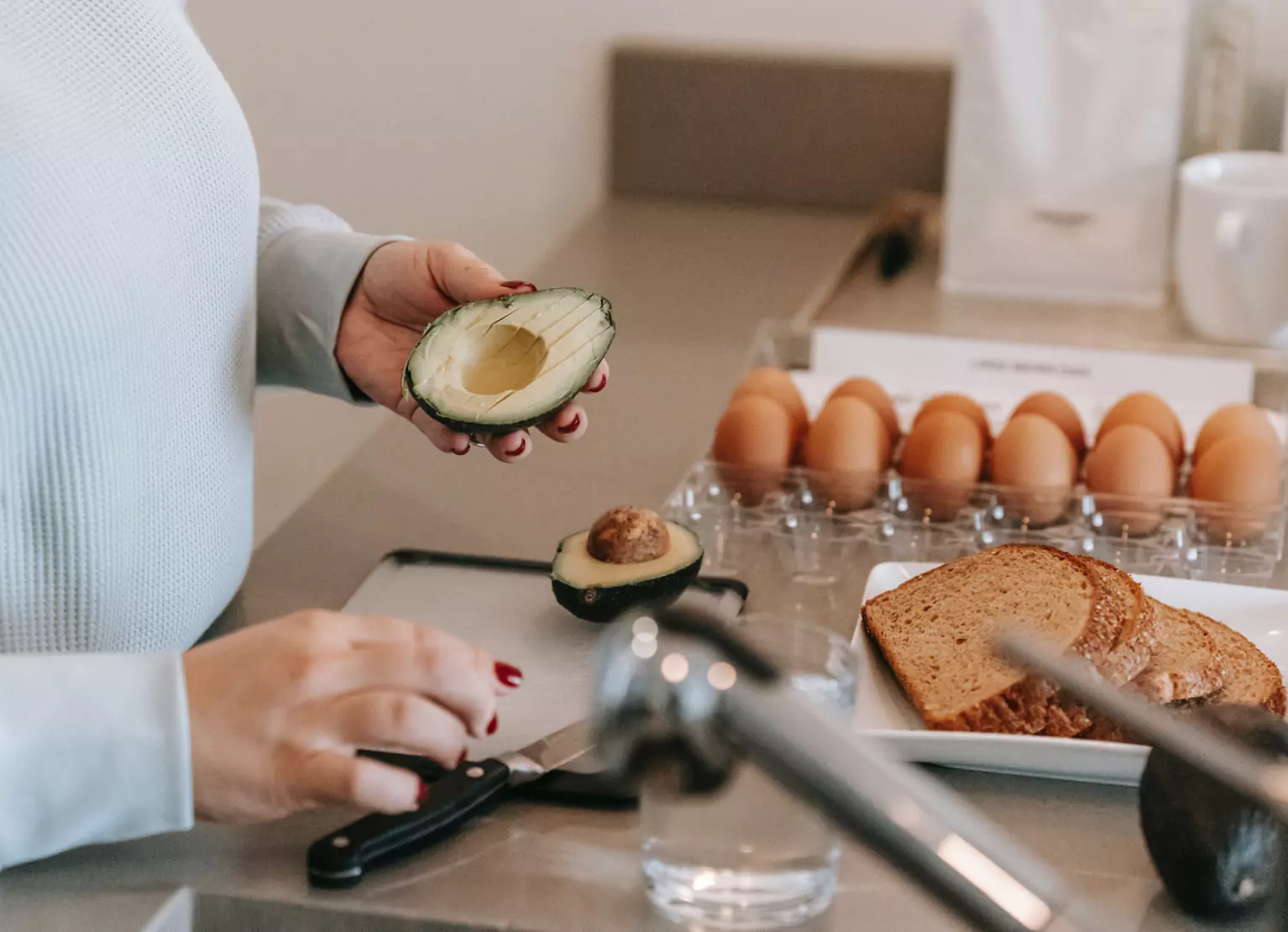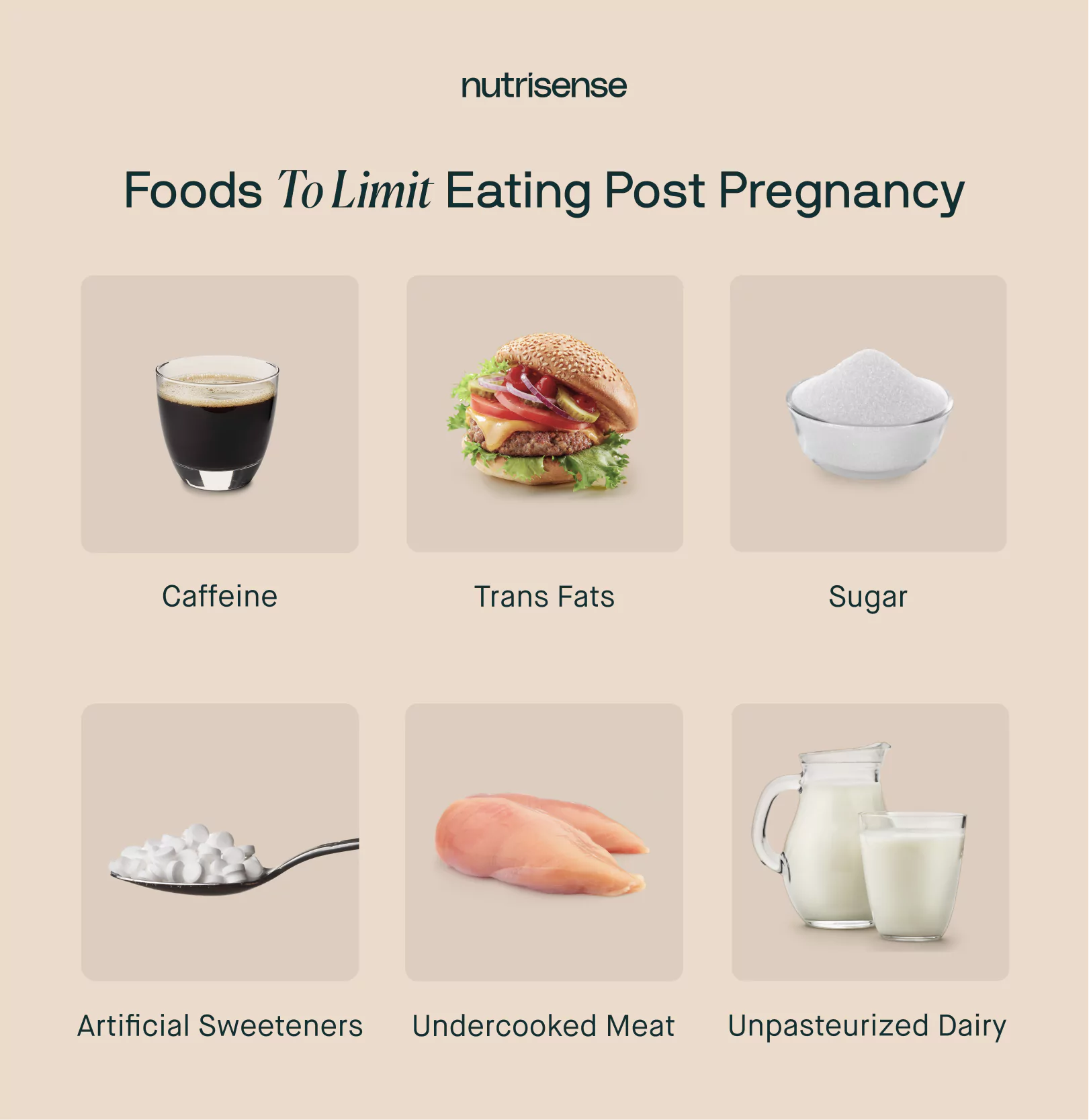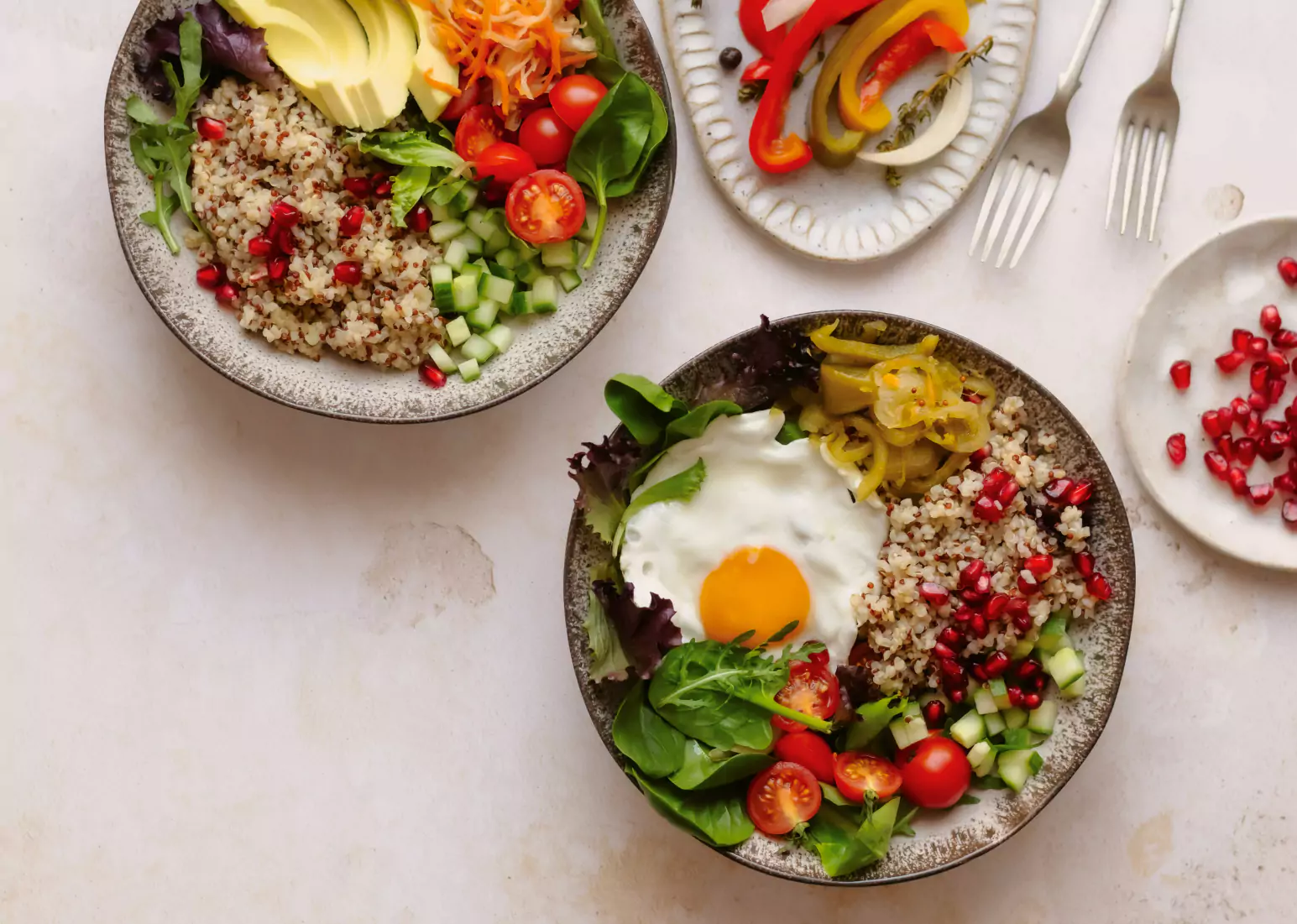Postpartum Nutrition: A Guide to Healthy Eating After Giving Birth

Key Takeaways
Pregnancy is an amazing, life-changing event. But it also takes a lot out of you—physically and emotionally. As a new mom, you may be eager to regain your pre-pregnancy body, which often involves losing the weight you gained during your pregnancy.
However, it's essential to take things slow and follow postpartum diet guidelines to stay healthy and happy after pregnancy.
After giving birth, take the time to recover and give your body the nutrients it needs to heal. For the first few weeks, many new moms struggle to decide how to eat. Depending on your delivery, you may be dealing with various physical changes and challenges.
Following a proper diet can make all the difference when you're recovering from childbirth and taking care of your little one, so let’s take a deeper look at postpartum nutrition. Read on to find out why postpartum nutrition is so vital for new parents and how to go about finding the right foods for your specific needs.
Why Is Nutrition so Important for New Moms?

After you give birth, your body goes through significant changes. In addition to dealing with childbirth's physical and emotional stress, the body is also working hard to recover from the pregnancy and prepare for breastfeeding.
As a result, postpartum nutrition is essential for both parent and child.
The first few weeks after childbirth are known as the fourth trimester; during this time, your body is still adjusting to the many changes it just underwent.
In addition to recovering from the physical stress of labor and delivery, it's also working to adjust hormone levels and replenish nutrient stores. These changes can result in fatigue, mood swings, and other symptoms.
It’s important to eat a balanced diet and drink plenty of fluids during this time. Eating nutritious food will support the healing process, help provide energy to care for your new baby, and ensure your newborn gets essential nutrients through breastmilk if you choose to breastfeed. Additionally, drinking plenty of fluids will help prevent dehydration, which can be a common problem during childbirth.
A Note on Nutrients and Breastfeeding
Your body stores nutrients during pregnancy to support the developing baby. After giving birth, you need to replace these stores. It's vital if you're breastfeeding, as you will use up additional nutrients and energy to produce milk.
Breastfeeding provides many benefits for both parent and child, including bonding, improved immunity, and lower rates of obesity. However, it is also essential to be aware of the nutritional needs of a breastfeeding parent. Postpartum nutrition is vital for breastfeeding parents, as they need to replenish their energy stores and provide their bodies with the nutrients necessary for milk production.
You can do a few things as a new parent to ensure you are getting the nutrients you need.
- First, It's generally recommended to eat a balanced diet with plenty of fruits, vegetables, high-quality protein, healthy fats, and whole grains, and drink plenty of fluids.
- It's also essential to consult with your health care provider to choose the right multivitamin or supplements you may need for your own individual health needs.
- For those who are breastfeeding, postpartum nutrition is vital. Breastmilk is over 80 percent water, so parents must stay hydrated. In addition, breastfeeding also uses extra calories, so new parents need to focus on breastfeeding using extra calories. Remember not to be too restrictive with your diet during this time.
- Foods high in protein, iron, and calcium are vital for nursing parents.
- Vitamin D is also extremely beneficial for breastfeeding, with experts recommending that breastfeeding parents supplement with 6400 IU daily to support your newborn’s health.
Remember, while postpartum nutrition is essential for all new parents, it is vital if you're breastfeeding to ensure your milk supply is full of essential vitamins and minerals for your baby.
The Best Diet If You Have Had a C-Section

Having a C-section can impact your diet in many ways. The surgery can cause stretching and tearing of the abdominal muscles, leading to pain and discomfort when eating.
In addition, many experience nausea and vomiting after surgery, making it challenging to maintain a healthy diet.
Here are some tips to help you recover from your C-section:
- Stay hydrated and make sure that you are drinking plenty of fluids.
- Chicken, fish, and tofu are excellent protein sources. Protein is essential for healing, so include plenty of protein-rich foods in your diet.
- Fiber helps to keep the digestive system moving, which can reduce the risk of constipation and help to prevent infection. Good sources of fiber include fruits, vegetables, whole grains, and beans.
- Vitamin C is vital for wound healing, so include plenty of vitamin C-rich foods in your diet. Good sources of vitamin C include oranges, grapefruit, broccoli, and Brussels sprouts.
- Minerals such as iron and zinc are also crucial for healing, so include foods like dark leafy greens in your diet.
Postpartum Weight Loss
After giving birth, it's normal to want to get back to pre-pregnancy weight as soon as possible. Despite what some celebrities might lead you to believe, you won't "bounce back" to pre-pregnancy weight overnight, and postpartum weight loss can be challenging.
Gaining weight during pregnancy is normal as your body changes, and it’s essential for your newborn’s health. After you give birth, you will likely lose some of that weight immediately. However, reaching your pre-pregnancy weight can sometimes take months or even years—which is totally okay!
Before starting a weight loss plan, giving yourself time to recover from childbirth is essential. In the first few weeks after delivery, your body sheds the extra fluid retained during pregnancy. You may also be less active than usual as you adjust to caring for a baby.
In the weeks and months following, you'll slowly lose more of this “baby weight” as your body returns to its pre-pregnancy state. To help with postpartum weight loss, focus on eating healthy foods and getting regular exercise when possible.
Avoid crash diets or other quick-fix solutions, as they can be harmful to your health and may make it harder to lose weight in the long run. These types of diets could also impact milk supply for some breastfeeding parents. With patience and perseverance, you'll eventually reach your goal weight.
Postpartum Diet Dos and Don’ts
After you have a baby, eating healthy foods is important to help your body recover and provide nutrients for your baby if you choose to breastfeed. Although you may be tempted to try the latest fad diet, there are some essential things to consider regarding your postpartum diet.
Healthy Foods to Include In Your Post Pregnancy Diet
First, let's talk about foods you should include in your diet. Things like fruits, vegetables, healthy fats, and whole grains are packed with nutrients to help your body heal and recover.
It's also important to get enough protein from high-quality sources, including quality meats, eggs, tofu, and legumes.
However, remember that everyone’s dietary needs and preferences will vary, and you should discuss your personal needs with a licensed medical professional. Here are a few things you can include in a well-rounded diet.

- Foods rich in fatty acids like omega-3s (fatty fish like sardines and mackerel are a great option).
- Proteins like chicken, fish, and beef are excellent protein sources.
- Fresh fruits and veggies for their vitamin, mineral, and fiber content
- Whole grains like quinoa and brown rice for carbohydrates.
- Lots of water to make sure you stay hydrated.
- Legumes like black beans, lentils, and garbanzo beans will boost your protein intake and help you add fiber to your diet. Remember, these are higher in carbs, so it’s a good idea to avoid pairing them with other high-carb options. Instead, have them with other protein or non-starchy vegetables.
Foods to Limit in Your Post Pregnancy Diet
Now let's talk about the don'ts. It's a good idea to steer clear of crash diets or any diet requiring you to severely restrict calories or food choices. These diets can do more harm than good by preventing your body from getting the nutrients it needs.
Additionally, you should limit processed foods, which are often high in sugar, salt, and unhealthy fats. So, when it comes to your postpartum diet, focus on eating whole foods that will nourish your body and help you recover.

As you can see from the picture above, it’s best to avoid the following:
- Unpasteurized cheeses and dairy products.
- Undercooked meat and poultry can contain bacteria.
- Avoid having more than 200 milligrams of caffeine per day.
- Try to avoid too much sugar and trans fat.
Mental Health After Pregnancy
Many new parents experience some form of the "baby blues" after giving birth. However, for some women, these feelings of sadness, anxiety, and fatigue can be more severe and long-lasting, potentially leading to postpartum depression. After pregnancy, many women experience various mental health issues, including postpartum depression, anxiety, and even PTSD.
Postpartum depression is a serious mental health condition that can profoundly impact both parent and child. If left untreated, postpartum depression can lead to parenting difficulties and put the parent at risk of developing chronic mental health conditions.
Thankfully, there are effective treatments available for postpartum depression, including medication and counseling. If you struggle after pregnancy, don't hesitate to seek help.
With the proper support, women can successfully navigate the challenges of early parenthood and emerge feeling happier and more confident than ever before.
Find the right Nutrisense programto turn insight into progress.
Go Beyond Glucose Data with Nutrisense
Your glucose can significantly impact how your body feels and functions. That’s why stable levels are an important factor in supporting overall wellbeing. But viewing glucose isn't enough. Nutrisense, you’ll be able to learn how to use your body's data to make informed lifestyle choices that support healthy living.
One-to-one coaching
Sign up to access insurance-covered video calls to work with a glucose expert: a personal registered dietitian or certified nutritionist who will help tailor your lifestyle and diet to your goals.
Monitor and measure what matters
With the Nutrisense CGM Program, you can monitor your glucose with health tech like glucose biosensors and continuous glucose monitor (CGM)s, and analyze the trends over time with the Nutrisense App. This will help you make the most informed choices about the foods you consume and their impact on your health.
Find your best fit
Ready to take the first step? Start with our quiz to find the right Nutrisense program to help you take control.

Jordyn has a bachelor’s degree in biology, a graduate degree in Human Nutrition and completed a dietetic internship at the Memphis VA. She's a dietitian at Nutrisense, and has experience working as a clinical dietitian at a VA medical center specializing in oncology and at the Mayo Clinic, working with a wide range of patients ranging from neonates in the NICU to adult ICU.




